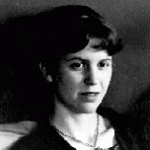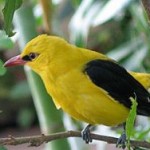Click here to read the poems.
Category Archives: Poems – All
A comparison of two poems by two women poets__Amy Siu
宋•李清照 (1084-1151)
Frog Autumn by Sylvia Plath (1932 –1963)
Both pieces are now translated by Amy Siu
Oriole Songs (2) by Kong Shiu Loon
Two Bilingual Nursery Rhymes__Kong Shiu Loon
小公雞,大紅帽 Little Rooster, Big Red Hat
小公雞 Little rooster
懂禮貎 Polite always he appears
見了太陽叫聲好 Saying hello to the morning sun
太陽公公笑呵呵 Father sun laughs happily singing ho ho ho
送牠一頂大紅帽 Giving him a big red hat to behold
採蘑菇 Gathering Mushrooms
黑兔和白兔 Rabbit black and rabbit white
上山採蘑菇 Gathering mushrooms on hills high
小猴和小鹿 Little monkey and small deer
一起來幫助 Joining in to help and to care
猴和兔,鹿和兔 Rabbit and monkey, deer and rabbit
高高興興採蘑菇 Happily they gather mushrooms bit by bit
百步洪__蘇軾(1037-1101)
长洪斗落生跳波 轻舟南下如投梭 水师绝叫凫雁起 乱石一线争磋磨
有如兔走鹰隼落 骏马下注千丈坡 断弦离柱箭脱手 飞电过隙珠翻荷
四山眩转风掠耳 但见流沫生千涡 险中得乐虽一快 何异水伯夸秋河
我生乘化日夜逝 坐觉一念逾新罗 纷纷争夺醉梦里 岂信荆棘埋铜驼
觉来俯仰失千劫 回视此水殊委蛇 君看岸边苍石上 古来篙眼如蜂窠
但应此心无所住 造物虽驶如余何 回船上马各归去 多言哓哓师所呵
Hundred Pace Rapids__Su Shi (1037-1101) 江紹倫譯
Waves leap stirred up by the long rapids steeply fall
On the river a skiff glides southward like a shooting ball
Water birds take fright startled by boatmen calls
Through scattered rocks it sails straight forward evermore
Like darting hares and wing-spread eagles sour
Like wild horses race downhill its slope freely fall
Like a lute string snaps and an arrow out of the bow
Lightning cleaves the sky and raindrops on lotus leaves roll Continue reading
Oriole Songs by Kong Shiu Loon
後園作回文詩 王融 (467-493)
後園作回文詩 Rear Garden Semordnilap* Poem
王融 Wang Rong (467-493)
陳耀國 譯 Tr. YK Chan
1 正讀 Forward
斜峰繞徑曲 Around precipitous peaks winding paths count,
聳石帶山連 Rocks shoot up in nexus on the mount.
花餘拂戲鳥 Flowers left standing birds play in their midst,
樹密隱鳴蟬 In woven branches hissing cicadas are hid.
2 反讀 Reverse
蟬鳴隱密樹 Cicadas hiss deep in thick woods top,
鳥戲拂餘花 Frolicking birds flutter as flowers flop.
連山帶石聳 The mount rises with rock columns high,
曲徑繞峰斜 Winding paths wrap around steep peaks nigh.
_____________________________________
*Cf. http://en.wiktionary.org/wiki/semordnilap
送蓬仙兄返裡有感 (1916) 周恩來(1898-1976)
相逢萍水亦前緣 負笈津門豈偶然
捫虱傾談驚四座 持螯下酒話當年
險夷不變應嘗膽 道義爭擔敢息肩
待得歸農功滿日 他年預卜買鄰錢
[《送蓬仙兄返裡有感》三首詩,作於一九一六年初,以“飛飛”的筆名發表於《敬業》第四期上。詩題中的“蓬仙兄”,是周恩來的同學好友張蓬仙,東北吉林人。 他在一九一三年秋和周恩來同時考進天津南開學校,是“敬業樂群會”的三個發起人之一,並任會長。 週任副會長兼《敬業》主編。 他由東北老家去日本後一年,周恩來也去了日本,常有交往。 “九·一八”前後,張蓬仙貧病交加,死於北京。]
Seeing Peng Hsien Homebound (1916) Three Poems 江紹倫譯
初見紅楓__余晃英
初見紅楓 (2012年9月22日)
涼風颯颯夏疾收
歲月無聲偷換秋
楓葉早沾濃洌味
半樹泛紅醉方休
[ Dear Mr Tam,
Saw some new red maple leaves this morning. Such picturesque scenery might remind you of your stay in Toronto. From Vancouver I send you get-well wishes with this verbal picture and hope it brings a sense of beauty and calmness with it.
Respectfully,
Yu Fong Ying (61 grad) ]
《次皞如夫子傷時事原韻》 (1916) 周恩來 (1898-1976)
茫茫大陸起風雲 舉國昏沉豈足雲
最是傷心秋又到 蟲聲唧唧不堪聞
[ 張皞如《傷時事原韻》原詩:
太平希望付煙雲,誤國人才何足雲;
孤客天涯空涕淚,傷心最怕讀新聞。
《次皞如夫子傷時事原韻》,是周恩來為反對張勛復辟而寫的重要作品。 一九一六年,袁世凱死後,張勛為了打擊孫中山先生領導的民主革命,處心積慮,勾結各地軍閥,在徐州訂立臭名昭著的北洋七省軍事攻守同盟,妄圖復辟封建帝制。 “皞如夫子”,即張皞如先生。 他當時是天津市南開學校的教師,有愛國民主思想,支持學生的進步活動,曾應“敬業樂群會”的邀請,欣然加入該會的詩團。 當他從報紙上看到軍閥徐州會盟的消息時,十分氣憤,疾書《傷時事》一詩。 周恩來讀後,當即步韻奉和一首,一同發表在《敬業》第五期上。
周恩來和詩,從軍閥重開戰的風雲突變寫起,明確地指出,由反動軍閥所造成的“舉國昏沉”的黑暗局面,是不足道的,表現出敢於蔑視強暴和立志變革現實的革命精神。 後兩句,以草木搖落的秋天和淒切哀婉的蟲鳴作為像徵,暗示了封建軍閥張勛之輩復辟倒退的喧囂,正如秋蟲一樣,不過是死前的悲鳴而已。
--引自周秉德《周恩來詩聯集箋注》序 ]
Reply to Master Kao Yu
Grieving Over Current Events (1916) 江紹倫譯
Winds and clouds whirl over our motherland violent
Need it be said that our countrymen are dozy and indolent
The biggest torment is that autumn is again here
Whence noisy insects their chirrs pierce the ear



